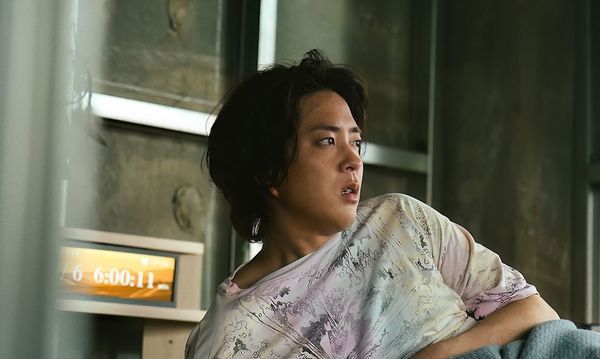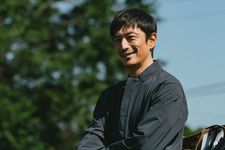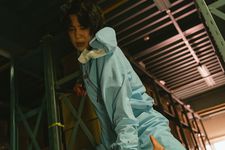 |
| Penalty Loop Photo: Fantasia International Film Festival |
When his girlfriend Yui is murdered, quiet, unassuming artist Yun is devastated. He can think of nothing but the need for revenge on the man suspected of being responsible – hydroponics worker Mizoguchi. Carefully, he works it out – finds him at work, disguising himself in a hazmat suit; incapacitating him; stabbing him to death; then disposing of the body. There’s just one problem. The next morning, he wakes up with a strange sense of déjà-vu. It’s Monday the 6th of June all over again. Mizoguchi is alive. He needs to carry out his plan once more.
We’ve all seen time loop stories before, but Penalty Loop has a few more tricks up its sleeve – and makes, all in all, a lot more sense. It screened as part of the 2024 Fantasia International Film Festival, and that’s how I found myself talking to its director, Araki Shinji. He began by explaining to me that it’s his second film and that he first didn’t really fit into any one genre, so he wanted to do something different this time. His English is good, but as the subject requires some less common vocabulary, a translator steps in to help. Readers should be aware that this interview contains minor spoilers.
“People in Japan are really big on putting movies into genre categories, and I really wanted to stand out from that for this one.
 |
| A smiling killer Photo: Fantasia International Film Festival |
“In Japan, it's an okay thing to get revenge. It’s acceptable.” Then, after a brief pause, he adds “But not now! In the Seventies or Eighties, it was okay. But if I killed one person one time, I think I would not be satisfied. If my lover was killed, I would want to kill him two times, three times. I don't know, but one time I don't think is enough. So maybe I have to have a loop to kill him many times. That was the start of my idea.”
He didn’t want viewers to get bored watching a time loop, he says, so he decided to change it up a bit and make it into a puzzle for them. He was very pleased with one version that he made, and didn’t know if he could surpass it, but had to keep pushing himself. Cinema offers lots of possibilities and he wanted to use that.
I tell him that I find the decision to focus on Yun interesting because as we gradually learn more about Yui, we learn that she’s caught up in an unusual lifestyle. The experience is a bit like that of watching a James Bond film but then following a Bond girl’s story instead of the ostensible hero’s – which doesn’t make it any less interesting.
“Even myself as a human being, I am somebody who takes my own perspective on things very lightly,” he says. “It's strange, but I don't really care about what school people went to or where they worked at. I mostly don't even care that much about what they're doing right now. I really care more about their feelings and about how they feel in a certain situation. As a Japanese, this makes me kind of different from the others.
“Even in my real life, when I date women, I don't pay so much attention to their opinions, and I don't ask a lot of questions about it. And I think that defines my own experience as a person. Even with my wife now, maybe it has linked through the movie, but I don't even know a lot about her, I can say, even though I've been with her for so long.
“Yui's story is really complicated. I feel like she was really on the side of justice up to a certain degree, and her life became extremely complicated. And after a while, watching her, you're not sure whether she's doing something good or something bad. Even around me, I know a lot of people who are working for the government in Japan and who feel that their lives are wasted. They don't know what they're working for.
“Also I feel women fight a lot more in society, and we don't see that enough in movies. There's a pattern that you often see in Japanese and even Western cinema, that the guy is the one that goes out in the morning to go fight his fight, and his wife just shrugs and say goodbye and goes back into the covers of the bed. And I feel like seeing something different is something that we need now in 2024, you know? That's something that I saw, especially in one of Al Pacino's movies, Heat.”
We don't actually spend much of the film with Jun and Yui together, so how did he approach building up that sense of the emotional connection between them?
“There were actually two additional scenes that I wanted to film, but they were scrapped by the producer,” he says. “I wanted to show them at the supermarket or going to marketplaces. They are two very different people who have very little in common. Yui is more on the side of pursuing something for justice, while Jun is more focused on himself and his art. And yeah, they stand really at opposite ends.”
We talk about the sound design, which is subdued overall but does a lot to direct our attention. The first time Jun goes after Mizoguchi, we are acutely aware of every sound that the hunted man, unaware of the threat he faces, is making.
 |
| Getting revenge (again) Photo: Fantasia International Film Festival |
“In cinema, theatres allow us to have a really rich experience,” he says. “Especially here in Fantasia, I was really moved by how much the sound reverberated. So, you know, when you listen to the sound design of a movie, it can tell you a lot of information about it. But at the same time, it's when there's less that sometimes you can get more. And so instead of adding dialogues, or instead of adding lines or adding sounds, I figured that it would better for me to work from it being more succinct in the real world.
“In the movie, there's very few sounds in general. It's when he goes outside that suddenly there's everything that happens around him. Like, you hear dogs barking, you hear noises of the city. And that's the contrast that I felt I wanted to tell using sounds. My sound director is somebody who works a lot with realism in sound design. So I made him do very loud noises, which he despised, but still, I forced him to do it.”
He’s very pleased to have his film screening at the Montreal festival.
“I'm really moved, and I was really surprised by my whole experience here. It was such a fun projection experience for me. I went to Brazil so far, and I went to Frankfurt in Germany, and I found that the people here, while they were really uplifted and cheerful, they were at the same time very serious about the more serious parts of the movie. And they laughed a lot when it was funny, so that was great.
“The first 20 minutes of the movie are really quiet, so I'm always worried that they're going to tune out of it. But when I scanned my eyes through the crowd during the movie, I found that everybody was watching intently, and that made me really happy.”





















